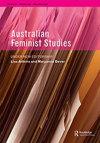Reading Jane Campion’s The Power of the Dog with Deutsch, Nietzsche and Nijinsky
IF 1.5
4区 社会学
Q2 WOMENS STUDIES
引用次数: 0
Abstract
In this article I argue that Jane Campion’s film The Power of the Dog (2021), can be read through Nietzsche’s The Birth of Tragedy (1967); and that Campion’s films more generally can be viewed insightfully in a Nietzschean frame. Campion’s films are often concerned with ancient mythic themes and forces that continue to find expression in later times and places. I argue that Campion is also a feminist filmmaker who questions Hollywood narrative cinema from a subject position of difference, from within its genres but re-writing and re-valuing the values of its ‘plots’ (Gillett, Sue. 2004. Views From Beyond the Mirror: The Films of Jane Campion. The Moving Image 7. Australia: Australian Teachers of Media, Australian Film Institute and Deakin University). Campion explores abiding psycho-social phenomena and needs – here, masculinity, men’s relations with ‘mother’ – by drawing on mythological figures in service to the present in original ways and as a female director. I draw on Hélène Deutsch’s (1969. A Psychoanalytic Study of The Myth of Dionysus and Apollo: Two Variants of the Son-Mother Relationship. The Freud Anniversary Lecture Series, The New York Psychoanalytic Institute. New York: International Universities Press Inc.) analysis and discussion of Apollonian and Dionysian mythologies in support of this argument.与多伊奇、尼采和尼金斯基一起阅读简·坎皮恩的《狗的力量》
在本文中,我认为简·坎皮恩的电影《狗的力量》(2021)可以通过尼采的《悲剧的诞生》(1967)来阅读;坎皮恩的电影更普遍地可以在尼采的框架中被深刻地看待。坎皮恩的电影经常关注古代神话的主题和力量,这些主题和力量在后来的时代和地方继续得到表达。我认为坎皮恩也是一位女权主义电影人,他从不同的主体位置,从其类型内部,重新编写和重新评估其“情节”的价值,质疑好莱坞叙事电影(吉列特,苏。2004)。从镜外看:简·坎皮恩的电影。动态影像澳大利亚:澳大利亚媒体教师、澳大利亚电影学院、迪肯大学)。坎皮恩以女性导演的身份,以原创的方式利用神话人物为当下服务,探索持久的社会心理现象和需求——在这里,男性气概、男性与“母亲”的关系。我借鉴了h2013.2013.12 Deutsch(1969)的观点。狄奥尼索斯和阿波罗神话的精神分析研究:母子关系的两种变体。弗洛伊德周年系列讲座,纽约精神分析研究所。纽约:国际大学出版社)对阿波罗神和酒神神话的分析和讨论,以支持这一论点。
本文章由计算机程序翻译,如有差异,请以英文原文为准。
求助全文
约1分钟内获得全文
求助全文
来源期刊

Australian Feminist Studies
WOMENS STUDIES-
CiteScore
2.50
自引率
0.00%
发文量
7
期刊介绍:
Australian Feminist Studies was launched in the summer of 1985 by the Research Centre for Women"s Studies at the University of Adelaide. During the subsequent two decades it has become a leading journal of feminist studies. As an international, peer-reviewed journal, Australian Feminist Studies is proud to sustain a clear political commitment to feminist teaching, research and scholarship. The journal publishes articles of the highest calibre from all around the world, that contribute to current developments and issues across a spectrum of feminisms.
 求助内容:
求助内容: 应助结果提醒方式:
应助结果提醒方式:


